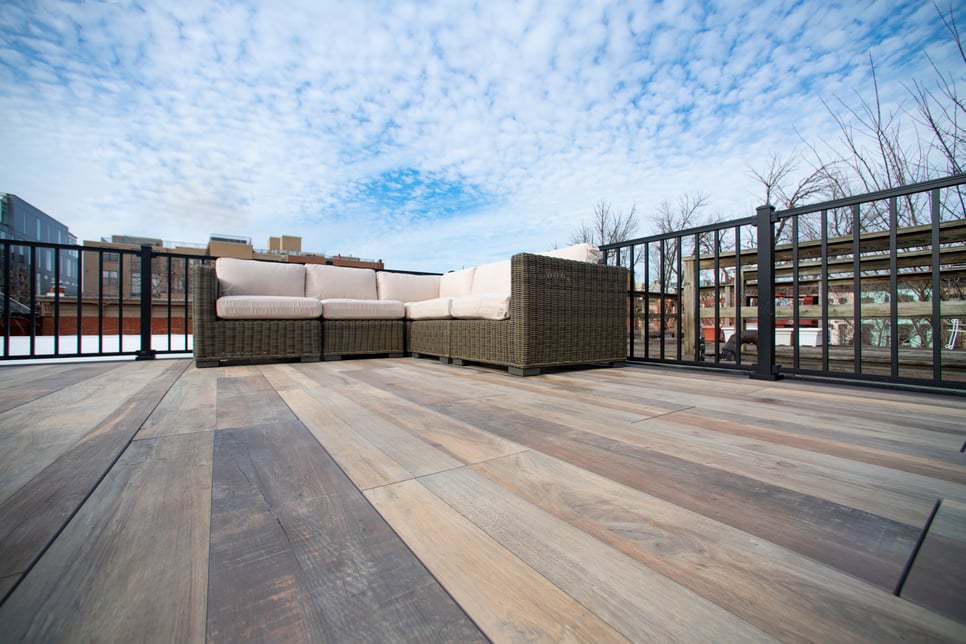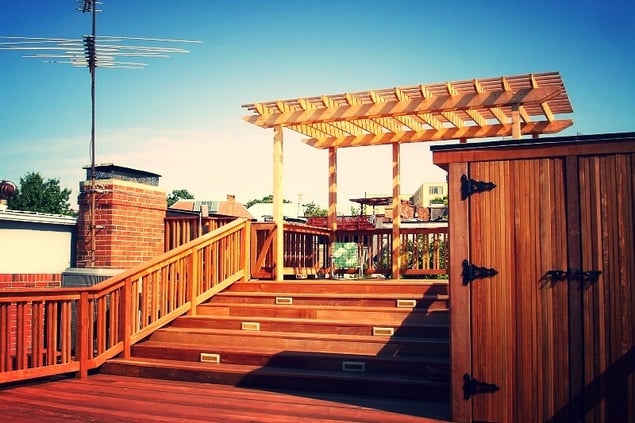
A rooftop deck is fundamentally different than a ground-level deck, and that extends to the materials you should use. Because of the extreme sun and weather exposure a rooftop deck in Maryland and northern Virginia, has to endure, you and your design and build team will need to carefully think through exactly what you want to use in order to receive the best aesthetics, price point, and longevity.
5 Possible Materials for Your Rooftop Deck or Rooftop Deck Replacement
-
Pressure-Treated Decking
One common and cost-effective product that people gravitate toward with rooftop projects is pressure-treated wood. Although it will require frequent maintenance due to the level of exposure it must sustain, this type of wood is generally up to the task.
-
Steel
If your budget allows for it, upgrading from pressure-treated decking to steel can offer many benefits. For one, having a steel deck frame helps ensure you aren’t replacing your frame before your decking boards, and the added strength and durability of the material provide peace of mind, which can be especially invaluable on a rooftop deck. Look into Evolution, by Fortress Building Products, for an industry-leading all-steel deck solution. -
Hardwood
Choosing hardwood will mean more up-front cost—as compared to pressure-treated decking. While more durable and resistant to the extreme temperature and weather fluctuations a rooftop deck must endure, it will still require frequent maintenance (such as staining) to keep it looking pristine.
-
Porcelain Pavers
Porcelain is an incredibly durable, lightweight, and low-maintenance option for any deck. The variety of aesthetic choices also ensures it complements or matches any existing design scheme. The reduced weight, in particular, makes it ideal for rooftop decks because of the minimal strain it places on the structure. Archatrak is one the leading names in this industry. If you’re interested in learning more about this material, check out these top 8 benefits of Archatrak deck tiles.
Mbrico is another popular brand of porcelain deck tiles. They're a solid rooftop decking option that offers a host of benefits, including strength, durability, and integration with ProLine radiant heat systems. -
Synthetic Turf of Synthetic Grass
People will often build rooftop decks in urban areas where there isn’t a lot of extra space to build outward. This means people are sometimes looking for these rooftop structures to serve as small green spaces in the midst of city life. In those cases, some people choose to add synthetic turf or synthetic grass. Some even convert the area into a small putting green. In terms of the construction plan, these structures are built just like decks. There’s a substrate base, and the synthetic material is then placed on top of that.
3 Rooftop Decking Materials to Avoid

-
PVC
Generally speaking, PVC is not recommended for rooftop decks. It can expand and contract drastically with temperature fluctuations, which are common in Virginia and Maryland throughout the year, making it less than ideal for these high-exposure structures. -
Capstock Composite Decking
Although many brands of capstock composite decking boards are highly recommended for ground-level decks, including Zuri, Azek, and more, professional build teams tend to discourage these products for rooftop decks. The amount of sun and exposure can lead to fading and other aesthetic failings over time. -
Stone Deck Tiles
Once you introduce stone to a rooftop deck, large structural questions come into play. That is, can the existing building handle the amount of weight and strain added by so many stone tiles? If stone is the desired rooftop material, it might necessitate structural upgrades to the building, such as steel columns and new beams. If your budget can accommodate those kinds of alterations, stone can be feasible, but for many that makes the project cost prohibitive.
If you work with your design and build team, there are lots of creative, nontraditional ways to utilize any rooftop space. For more information about how you can customize your rooftop structure in Maryland and Northern Virginia, please feel free to contact a representative of Design Builders, Inc., today!


